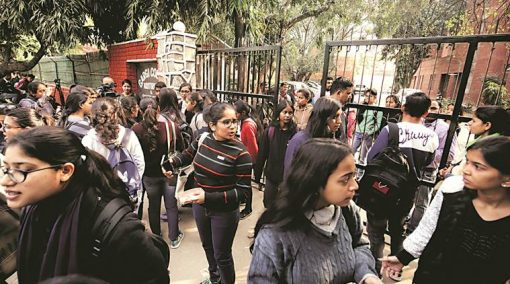
Amid an intensifying agitation against the Citizenship Amendment Act (CAA) and the National Register of Citizens (NRC) with students and especially women at the front line, accounts of mass sexual assault have surfaced from Delhi University’s Gargi College.
Ten people have been arrested in connection with incident so far. A Supreme Court bench headed by Chief Justice S. A. Bobde asked lawyer M. L. Sharma, who mentioned the matter seeking urgent hearing, to move the Delhi High Court with his plea. The apex court said it would like to have the Delhi HC’s view in the matter. Over 11 police teams are looking at technical details and have also visited various sites in the National Capital Region (NCR) to identify suspects and investigate the case, said the police.
Students have narrated accounts of sexual harassment to NewsClick, saying they were groped and molested by a group of men who had forced their way into their annual cultural festival 'Reverie' on February 6. It happened after a pro-CAA rally in the area and several women said that security personnel and the police just stood by and watched all of it while it was happening.
Women have pointed out that this was not a lone incident and therefore, cannot be looked at in isolation with the ongoing resistance.
The fight against patriarchy and fascism
While women in Gargi College were assaulted by a “drunk mob”, female students of another varsity, Jamia Milia Islamia, were also assaulted. They were beaten up by police forces on February 10 with many reporting injuries on private parts, calling the brutality “state sponsored sexual assault” while pointing toward the face of rising fascism- the ruling Bharatiya Janata Party (BJP).
A student, who wishes to remain anonymous, said that molestation and abuse are “an annual phenomenon in the college. I was grabbed by my buttocks last year while standing in a queue to enter the college. A boy tapped my friend's breasts. Before we could respond, he disappeared into the crowd.”
Another student from Gargi college said that the programme began at 7:30 p.m. and that “by then, outsiders molested us, and even masturbated in the open. When students went to register their complaint, the Principal asked: ‘If you feel so unsafe, why do you come to the festival?’ The college administration went to the extent of questioning the ‘character and behaviour’ of the girls by shaming them and further silencing them from sharing their accounts.”
The reported sexual assault on students purportedly right-wing males sheds light on the intrinsic link between patriarchy and fascism and more importantly, the centrality of women in the protests, who are trying to counter the reductive stereotypes that try to define the reality of ‘Indian women.’
Senior Journalist Bhasha Singh, who reported from the ground, spoke to NewsClick mentioning that the way college administration responded to the incident shows “a crude attitude of the people. There is no scope for doubt that the men belonged or affiliated themselves with the BJP or its student wing the ABVP.” She added: “The men were questioning why women are dancing, why were they out enjoying themselves? It is an anti-women mindset rooted in sexism and patriarchy.”
The eminent historian of fascism, Eugen Weber, has written that fascism always emerges in response to the rising power of women. The Nazis emerged after a decade of democracy where women had a right to vote. Weber says that fascism in all forms will try and re-establish patriarchy, not just in family but also society and government.
These kinds of tendencies come about due to the deeply-rooted beliefs of the Rashtriya Swayamsevak Sangh (RSS) which views women in hierarchical terms and gives them a secondary status.
The organisation’s second Supremo M.S. Golwalkar wrote in his book, ‘Bunch of Thoughts’, that “women are predominantly mothers who should rear their children.” Women were asked to form a separate organisation calling itself 'Rashtra Sevika Samiti' which after 80 plus years of existence, is still focused on imparting ‘sanskar’ (values) to children and, thereby, strengthening society and the nation.
Speaking to NewsClick, Kavita Krishnan of the All India Progressive Women's Association (AIPWA), said that what happened at Gargi was “public shaming and sexualisation of female students. Men belonging to the RSS-affiliated BJP and ABVP assaulted women for their ideology. For them the idea of Beti Bachao is very narrow in terms of what kind of a woman they want to ‘save’. If one is a student, they are termed ‘anti-national’ and ‘urban naxal’; essentially fair game for these men.”
Speaking to NewsClick, a student from the college said that they do not want to “politicise our cause because it is a matter of the most basic rights for us.” Japleen Pasricha, founder of Feminism in India said: “In the current political climate, it is becoming increasingly 'easier' for people to show their goondaism and hatred towards the 'other' because they know they will not be held accountable. This culture of apathy must stop, and we need to keep making noise and raise your voices to not normalise this kind of violence against women and young people.”




